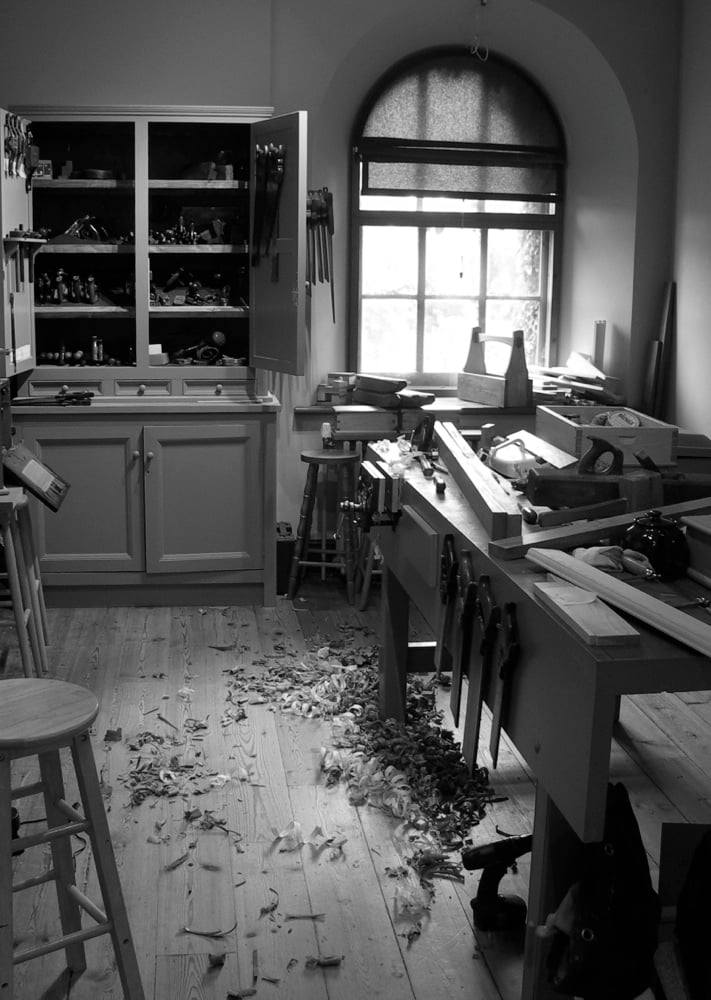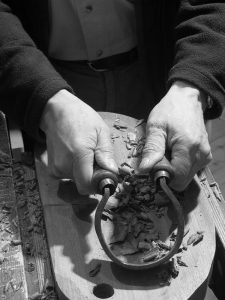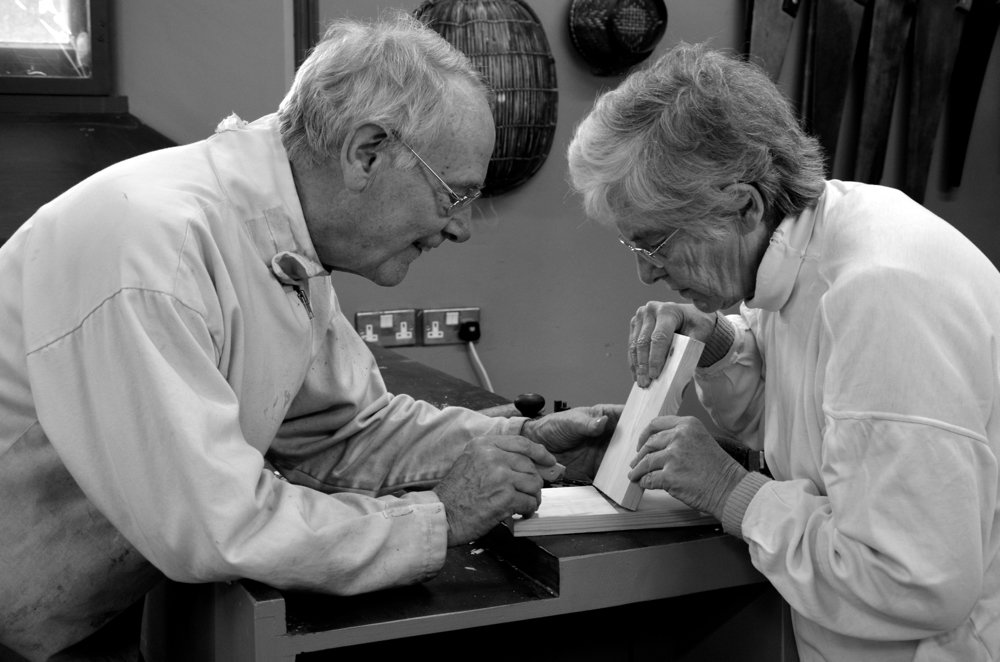Time for changing perspectives
Sometimes I do wonder why woodworking as a trade or profession is declining. I wonder whether it could ever return for people who like me knew there corner in their early teens. Some say it was easier for me then than those looking for a way of work today, but few really understand the fight it took. Few of us really understand that the consumerism they feel is a right might well be the very thing that’s destroyed craft and the art of work and even life. Where we are today didn’t start with the internet but with the industrialising of people centuries ago. Creating a dynamic by which people worked to buy rather than work to make the things essential to life birthed a way of getting people to work primarily for money.



Apparently these workers would remain if the work was interesting and challenging and they had support of good people around them. Another ingredient important to people is open and honest communication between all involved. Few would actually remain for a higher pay scale. Craft work and working with other people in close association seems to me essential to my craft and my own wellbeing.
My hope today is that the work I am doing will influence people enough for them to start thinking cluster-group cooperatives of three to four people starting woodworking businesses, associations or enterprises that are NOT purely money-based but relationships based surrounding likeminded business ambitions where the members earn enough to support their lives, families and lifestyle. Shared workspace, work, studio space and so much more could be the way forward. What do you think. Could some things become a thing of the past if people had an alternative of likeminded artisans and wannabes enough to be creative? I think it could happen.


Here’s what I see happening: We are headed toward a future where computers will direct the making and even the designing of the functional things we need to survive. This seems like a curse but it will actually be a blessing, as people will be increasingly freed from doing drudgery, and can instead make things that cannot be made by computers – in other words, people will be freed to pursue artistic craftsmanship once again – to be human, if you prefer, rather than to be an extension of industrial machinery. I don’t know if that will be in 25 years, or 150 years, but I do think with the progress of technology, it’s coming. Freed from the constraints of cost and limited time availability, it will be an artistic world, and I mean “artistic” broadly defined (e.g., hand woodworking) rather than paintings and such.
OR maybe we’ll just blow ourselves up and be living in caves, instead? 🙂
Paul,
Without sounding too doomsday-ish. The world monetary system is presently running on unsustainable fiat currencies with all western nations in serious debt territory. When this unwinds, and it will, people will be seeking smaller productive artisan lifestyles because they will have to. Societies will change.
Unappreciated manual and mental skills will return to the fore out of necessity and will become all the more important to hold communities together. Money after all is only a promissory note to exchange goods and services. It has been warped into a value belief system of smoke and mirrors to benefit the ultra wealthy.
Our humanity lies in what we do and how we go about it. I have found that people become highly creative when there is no money available. They find solutions to problems and better yet they find ‘themselves’. I hope the younger generation of readers understand and appreciate what you are giving them through the courses. It is the future and the way forward.
Yes, exciting future in hard work but real values again.
Dear Paul, An interesting blog. I agree that appropriate education (with a view to application) is key. This in turn is driven by having good educators and demand for products and the skills to produce at the right price. You can see where I am heading. I worked as Middle Manager for 39 years…training and skills were all in-house until about mid-80’s, when technical resource was often outsourced, and core people weren’t replaced via UK trainees. We had the cream of young overseas (mainly Indian) talent to interview via teleconferencing and the successful applicant emigrated to UK (with family) within a week or two. They were less expensive to employ and very skilled and dedicated. They were also individualistic and not always team players. Our UK graduates were somewhat ousted and frankly not often as good as foreign applicants. So as a global company we continued to lead and often underpin the UK and global telecoms independents with our skill and services. The tight knit localised technical communities, located in the same rooms and buildings were no more; these were the telecoms equivalent of craftsman groups except dealing in computing skills. Young nephews and nieces chase the money, as they feel it’s what work is about now; our skilled computing immigrants often moved on to other countries and had no allegiance to our company or the UK. The latter is in huge debt and the UK populace are expected to pay it off via taxes etc. over many generations. A friend now produces and designs leather goods, and most his production is in India as he finds UK artisans inflexible expensive and slow. Thankfully we still lead the world in some areas (motor cars, motor racing, fine gunmaking, etc) and may need look to see what it is about their products and artisans which preserves the skills and keeps people employed. Sorry for the long entry; newly retired may explain my musings.
Well, I still think consumerism is self seeking and at a cost that rarely considers the heavy price of the ever-heavy footprints for those yet to come. I’d rather do without, recycle, upcycle, apprentice or whatever to make less of a marred future for those coming into my craft in my community. I don’t altogether understand the globalisation and fracturing of cultures and families that’s happening that seems more to destroy the very things that we once enjoyed when we visited another country. It was what made us different that made for respect, not what made us the homogenised world we’ve become through consumerism.
I walk in a gift shop here on the coast and see the same ducks on sale I saw in gift shops throughout the USA and throughout IKEA stores too. But we have got more stuff cheap haven’t we. Now we can all buy the same ducks at least.
Dear Paul and everyone, I find all the comments interesting and it’s obviously a topic people feel passionately about. I really do appreciate the craftsmanship Paul demonstrate some, and his incredible generosity in sharing his skills and common sense outlook. And there is a niche market for people who can produce items to a high standard, or for skilled woodworking in communities (perhaps more in rural areas, where sometimes goods and services are bartered, or people employed by the relatively few large estates). But looking at the 55 million or so people in the UK, and a means to support growing numbers and families with just the basics needed to live healthy lives, then returning to artisan trades and values may not be the answer for most people. If I really looked more closely at why my company prospered it’s because it adapted it’s cost and skill sourcing to provide what was needed in a global market. I agree consumerism isn’t good longer term, but it’s future lies in the hands of consumers – if it provides what they perceive is needed it will thrive. One personal measure I use before buying is to ask myself if the product will end up as just more landfill and by when. If I really do need the item I will still buy it. We can evangelise but it may not change consumerism and the UK unless it is part of a political and economic agenda. The values Paul champions were part of my upbringing, at school and at work, but I grew up in the 1960s in a different world to today. I am still largely connected to that old world and find the knew one unappealing. Having done my time at full time employment I am in this fortunate position, unlike many in the UK. Thanks for reading this comment.
Paul,
Unfortunately people do not realise the fun and pleasure of making things for themselves. I sit on a chair I made at a table I made, and sleep on a bed I made. When. I say this, people look at me as if. I am crazy, and turn back to Facebook. I am happy, I hope they are. I have given up trying to convince them.
Chris
Sir; Your critique of consumerism seems to cover far more ground than is apparent at first glance and barring a go at ideological clashes, institutionalized indoctrination, economic manipulation, communication franchises and resource competition I would like to get the boot in on one topic, similar ducks found on different sides of a pond.
I first noticed this trend in the tourist traps of New England, back in the 90’s, though for me it was the small cedar articles and assorted novelties -ducks in all but name. At that time I noticed that the number of mass produced items was beginning to edge out the preponderance of locally produced items I remembered from years prior. As my interest in these sorts of trinkets derives more from the creativity displayed by many hands evolving similar items than from any intrinsic worth, I gave it a bit of thought, but never really came up with a satisfactory explanation.
Having made a decision (duly discussed and vetted by the wife,) to move from the service industry into value added (as I wanted to feel I’d been part of making something,) I recall noticing a complete set of the Thomas Register, sitting dusty and idle on a factory shelf. That image dropped the penny for me as I remembered how years ago finding a new source for some widget was largely based on trade catalogs, word-of-mouth, or consulting someone with specialized knowledge.
At present, the internet (the irony here is appreciated,) affords any the opportunity to locate a plethora of competing widgets complete with price points (the lowest,) unlimited quantities (from 1 to 1000) and ease of transaction (in the case of the tourist traps, no more chatting with a dozen or more individual craftspeople just to stock a couple of shelves.) .
The down side (from another perspective, and paying due homage to our collective natures -yes, I do place myself here for being just as lazy and cheap as the next guy,) is that the cheapest and most versatile widgets are often made in the same plant; hence the same ducks in many ponds, and an end to cottage industries serving the mass market.
Thankfully, the very same internet has expanded considerably since the 90’s and now allows many (an ever, growing number from what I can see,) small shops access to markets wide enough for them to thrive. Some of the better woodworking tool manufactures come to mind in this context.
In all, while the shopfronts are well stocked (with the duck clones,) we can still find (at the expense of a lack of environmental ambiance that goes with the shops,) a goose, if we want one. We just need to hunt for them in the bathtub (or wherever the computer happens to be,) instead of a pond.
Regardless of the philosophical discourses of any age, I think the essential natures of people haven’t changed too much over the years (perhaps that’s good, or bad,) and we naysayers (I do agree with the essence of your arguments,) are simply concerned that the boat is rocking in a swell rather than leaking.
Let me thank you again, for your time and attitude towards disseminating craftsmanship. Your perseverance, patience and tenacity is just outstanding.
All the Best,
Casey
When the people of Cuba found that Russia had effectively withdrawn support of them they found staggering ingenuity and began growing plants and crops in the most unusual places in towns and cities. They had to find many ways to change the way they did things, how things were re-used and up cycled. Cuba became a country studied by scientists fascinated by how a population could change so staggeringly quickly when it had to stand on its own two feet. Other countries could learn lessons. Why do we have to wait for the pain to be bad enough to make the changes?
Because we’ve become programmed consumerists? We think cheaper more affordable stuff should be our contribution to the world and now we are global consumerists but we never really counted the cost I suppose.
Dear all, still reading all comments and finding them interesting. I guess what I am reading is more about personal fulfilment via crafts, than changing the day to day production of items people buy (there is probably room for bespoke and mass produced, so long as we consider longer impact on environment and resources). The personal value of working at a craft with hand tools is in doubt; it’s even used to help people suffering from mental illness and dementia (the latter is our biggest health threat with the UK government now spending more on dementia than cancer and heart disease put together). But if you have a moment please read Matthew Ridley in the London Times Opinion column today – you view it free on your kindle(14 day free trial). It talks about the impact and benefit of computing to the world over the last fifty years, and future for all. Unfortunately the UK is in danger of missing the boat, and jobs disappearing to other countries or immigrants to the UK. Not everyone works or would want to work on computing, but it will influence our wellbeing and lives, whether or not we fully appreciate the extent. In some ways those working in computing are modern craftsmen and in previous generations would probably have been tool makers.
Paul – no worries – you do – and I am working hard with my projects, sharpening, restoring used tools, reading books etc… I am on my way there – is just that it takes a LOT of time to learn all this by yourself – And there is not better way to learn that doing it. And I do not want to introduce myself to a potential customer and than deliver sub-par – I will hate. Years of preparations – I trust God it will pay off.
PS That is why I do not have the time to write here, even though I am reading all your newsletters… Thank you for all
I don’t agree with your general sentiment about consumerism. As a whole, our standard of living has greatly increased because of the availability of affordable goods.
I know I couldn’t afford at 30 what I can now, and am grateful that stores such as Ikea existed then and now. As we mature and (hopefully) gain more financial freedom, we can afford the better things in life, which can include hand made furniture. There’s a place and time for everything.
I for one don’t want to go back to the time when nearly everything was made by craftsman. That being said, I do wish people where more informed about what makes for fine furniture. I’m hopeful that that often comes with age.
You are right, your standard of living has greatly increased because of consumerism and the greatly increased availability of affordable stuff.
Possibly your standard of living has improved. I dunno. I do know that the world doesn’t revolve around your reality, and that corporate consumerism has seriously (too often fatally) impacted the quality of life for much of the world’s population. A lot of people are less concerned about Ikea’s fine disposable furniture than they are about providing basic necessities for their families. I wouldn’t worry about going back to anything (you can’t), we’re all going to have to face the future with the remaining resources that are left.
Money….I suppose we’ll drown in it, or be crushed by all our affordable things. Personally quality of life to me is incredibly entwined with pride. Your ending statement is built on the preconception that you have to be old to buy expensive things, indicating a disposable income. Which will be the sum of a productive life being such an excellent battery for the economy.
We all know hand made things will always have genuine quality vs. those made by machine. What’s sad is that it sounds like you’re willing spend more than half your life seeking financial freedom. Freedom you think you need to BUY these expensive things that contain so much quality. Go out and learn to make em! It’s affordable.
Personally finances, cash, economy, greed, consumerism, globalization, have not a thing to do with any variety of freedom.
Marty is very right about the industrial revolution increasing the standard of living of the average person in the West, and now globally. The most interesting, and well researched, example is the availability of cotton clothing in the 19th century. Affordable, mill-produced cotton clothing revolutionized the average person’s standard of living. They didn’t have to wear course, expensive, wool clothes full of lice and varmin until they fell off in rags. A similar effect can be seen at Walmart, where the biggest beneficiaries are the working poor. I come from a blue collar family and can very much appreciate the difference those few bucks make to the average family that have to buy shoes and winter coats for their kids.
The problem as I see it is that the race to cheap has a cost, as Paul has alluded to. While it does allow many people worldwide to have a better life on very little earnings, it is also eroding the producer culture that made the West the most technically advanced civilization in human history. There is also the issue that is often called “consumerism,” which is a crass disposable culture that also undermines the economy of small things and an understanding of quality and worth. It’s like a science fiction story where this marvelously advanced civilization collapses because its denizens have forgotten how everything works or how to fix it or, for that matter, the function of the machinery of life in the first instance. We’re becoming a culture of dullards looking about us as if this all popped into existence yesterday.
I’m very thankful for Paul for this reason, passing on his knowledge. I think he is right to fear there was a very real chance of his kind of skill and knowledge dying from the Earth, impoverishing us all and all future generations.
True, although I think Paul is talking about “quality of life” rather than “standard of living”. One thing I have learned in 55 years is that there is a difference between those two. For example, the factory worker in my neck of the woods has a high standard of living (drives a new truck, lives in a good house, etc.) but if you’ve ever worked a job like his, you know that he has a poor quality of life.
I think you are right. Part of the problem today is a loss of perspective on the past. We fail to appreciate how rich we are, which diminishes and denigrates the unimaginable accomplishments of our ancestors here in the West. The average Westerner 200 years ago had a standard of living equivalent to a modern Bangladeshi. Think about that for a moment. The average Westerner had no time for such luxuries as hobbies because they worked 15 hour days, 6 days a week, with a half-day for the Sabbath, and that provided a bit more than subsistance. They worked hard to improve efficiencies, make things better, faster, cheaper to improve their lot, and bore unbelievable hardships to bequeath to us today a vast wealth. We have an unbelievable level of wealth and ease compared to them only 100 years ago.
But what we have gained in quantity in all things in our life – disposable income, free time, “stuff”, education and other opportunities for our children – we have also seemed to lost along the path some quality in life. The pendulum has swung too far in some aspects of our economic and non-economic life. What I’m trying to say, and the message I read into Paul’s musings on the subject as well (not that I’m speaking for Paul in any respect), is that many of us see the need now for a new balance, to bring some quality back into our quantities. We are certainly rich enough today for the luxury of taking a bit more time, and stopping to smell the roses and enjoy good work, good time with our families and friends, and a little less squandering it chasing after it all. A wise man once wrote that it is all “vanity and chasing after wind” and all that is worthy in life is the work we do. Balance is what we are looking for.
“…is that many of us see the need now for a new balance, to bring some quality back into our quantities.”
Indeed!
I wouldn’t compare consumerism to a sci-fi story though, Rockefeller, Carnegie, and Morgan made it real and sold it to the world. Don’t forget that prior to that the need for all that cotton was spurred by one machine design, a design that divided a country and ultimately killed or wounded close to 1.5 million people.
Paul, I appreciate your comments and agree with your assessment of society. It seems that often people who work with their hand ( These days) are looked down upon. I know when I was a journeyman welder and steel fabricator I was looked down upon.
My parents generation who grew up during the depression and served in World War Two had ( in my view) had a more holistic view and attitude towards work and the value of a hard earned dollar. I too hope society will reassess their value system and come to appreciate the simple and real value things in life and come to appreciate the value of hand craft and those who create things of quality.
Paul, Your mission in life is much more far reaching than what meets the eye and I for one am grateful for your efforts. Thank you and your staff for what you do.
The Industrial Revolution of the 19th century pulled a fast one on craftsmen. While mass-producing hand tools and making hand woodworking more accessible, it was making the craft obsolete with machines that churned out furniture and other wood products so fast and cheaply as to put the traditional craftsman out of business. Perhaps today it is coming full circle. The Internet (your videos and blog) and eBay (inexpensive quality tools) have enabled us to re-capture a nearly lost art. If not for those two ingredients, I’d still be a slave to power tool machinery, never realizing what I was missing (although having a nagging suspicion that something was wrong).
Often we don’t see that the cost for today’s creature comforts and cheaper goods is not actually our bill and neither did we actually work for it let alone work hard for it. We need to look a little further down the road to become better stewards for the sons and daughters of everyone and not just our own.
Your approach to creativity and to the appreciation of values of life is inspiring! I feel you would enjoy to meet with Sir Ken Robinson one day! ( https://www.youtube.com/watch?v=FLbXrNGVXfE )
I too feel -and try to drive- change is needed to the educational system in establishing an environment where young people are encouraged to seek their talents and then start developing those. Currently I feel more and more estranged from society where young lives are shaped to a set of expectations whereas I feel we should seek to stay open minded and let the young lives surprise us by the unexpected qualities and ideas. A growing number of young people struggle and go under in the waves of the current modern world, they don’t “fit” and cannot find their place to contribute by finding and working a job 40 hours a week. It is fantastic when such fine examples find a coach (like you) who enables a guidance (not instruction!) and therein find their passion and develop a skill-set which would never be possible in the widely accepted school programs.
Be it woodworking or other creative skills….
Hi Paul!
Most people don’t know what quality means anymore, because they never experienced.
When I built my table (thx to your taught techniques) I get an idea what quality in furniture making means.
I know my joints are the joints of a beginner. Perhaps they are miles away from the quality joints that you can build. But they hold very well and they are of better quality than those joints which are used in all that cheapish stuff. Now I understand the saying of my grandfather “I am not that rich that I can afford to buy cheap”.
Let me try to explain my thoughts about economy by using an example:
First I think there were the artisan furniture makers.
Then the machine produced furniture came in producing furniture which were still
good quality but cheaper. The people started to forget what the quality differences are.
It has to be cheap and quality falls.
Then the artisans lost ground and prices raise. And in the end (today) the machine made furniture can be sold very expensive because better or true quality isn’t available anymore.
In the past the competition in making something was mainly doing it better than the competitor.
Today the competition is doing it cheaper than the competitor. And that is a job killing downward spiral. But the bosses of the companies don’t even realise that they are dismissing their customers, because those people who are doing the job cheaper in asia or whereever still can’t afford the products they are making. And so it had to be cheaper and cheaper and cheaper……until they destroyed themselves. Thereby those creative employees in those companies who wants to do their job as good as possible loose their fulfilment that they once felt when they designed a quality product.
That example can be transfered to many industries e.g. tool making companies.
So thank you for your efforts to fill so many lives with fulfilment and satisfaction.
Dominik
Never mind consumerism, for many the pursuit of money is only about being able to afford to buy their own house. House price as a multiple of salary has accelerated rapidly. Breaking the mold (or throwing clogs in to the loom) in these circumstances is pretty much impossible for many.
The cheap, disposable, items that they buy are probably a very small problem compared to this bigger one. Much as I dislike the throw-away culture.
Nail on the head – I simply can’t afford a house or even to rent a house at present with two young children and my wife. But I will say that I have learnt how to utilize a small space really well in our 1 bed apartment! And the future for my wife and I is bright because we work really well on making our home great. She said something profound to me the other day. “Hoping for a future, that you’re not participating in today”. To me if you are wanting your future to be different then take deliberate steps towards it in the present but be mindful to live in the present because we are not in the future. That way you have a clear aim but you’re not spending your life wishing for something else (grass is always greener). I don’t know if that makes sense to anyone reading it!
Yesterday’s gone, tomorrow doesn’t yet exist, so make the most of today for tomorrow. Makes it simple. Seize the hour and the day. Tomorrow has enough troubles of its own.
A much more concise way of putting it!
Makes a lot of sense to me!
Paul, I couldn’t agree more. It was drummed into me in my youth to “…be a boss….”, “..be a doctor…”. Having retired at age 67 with one Baccalaureate and tw Masters degrees (back in the day when those degree meant more than simply plunking down the tuition and putting in the time), I’m not a Doctor, but close enough. But, today, if I had to depend on those degrees to eat, I’d starve in a month.
I was a “boss”. It’s when I truly learned the meanings of falsity and double dealing.
Although I well and truly contributed as best I could in my work, working at a desk destroyed my health.
Trying to make up for the time now by following my grandfather’s carpenter footsteps may not work; I haven’t the time. Time is prematurely just plain running out.
I strongly recommend Yuval Noah Harari’s Sapiens: A Brief History of Humankind, Feb 10, 2015. I’d send you my copy, but it was the online course that I took:. It was interesting to note that in the 70,000 years of Homo Sapiens’ here on earth, the best quality of life was probably had by hunter-gatherers.
I followed what I was taught and it was an error — probably an irretrievable mistake. I have literally not enough time during each day to make up for it, try as I might.
Strange that I can afford what I want today (not a Ferrari), but a visit to your school is well within reach, except for my health and endurance. I can afford necessary health club gym fees, but I have to measure out the time. The music lessons my mother couldn’t afford when I was a child are monetarily a pittance to me now, but for the time. Even retired, those two hours a week are a serious tradeoff for the rest of that day, even for the rest of that part of the week.
Own up! We did this ourselves. Except for those fortunate few who stepped aside and let themelves miss the scheduled bus for the precious opportunity to walk.
I am 32 years old and thanks to Paul’s online education and mentoring, I am retiring in two months. I am retiring to be a craftsman and artisan and working with my hands. My family and I are able to walk away from my high paying job and benefits by changing our way of life. We have purchased a RV and plan to sell the house and live in it. I have already made the wood shop in the back of the RV and we have started selling all of the “stuff” in the house. In 6 weeks I turn in my two weeks notice. I can’t wait. Paul, real woodworking is preserved in Jacksonville, Florida.
And speaking of Florida, I like Paul’s idea to team up and build a co-operative business. Let me know if anyone is interested in the Jacksonville or St. Augustine area, both are great tourist towns to sell craft. Our businesses would not compete with each other, because we can only make so many pieces a month. Rather, we would complement each other by having more goods and selection and splitting the overhead costs of getting wood and a store front and marketing. Reply if interested.
I think the problem is not money or consumerism, the problem are the people. We have created a consumer society, which is better than most have. We need to continually external stimuli, tv, music, shopping, etc … And all because we are not able to stop us and as I said Socrates “Knowing yourself” be aware of our fears, frustrations, envy, vanity ….
I really like the idea of small cooperatives working, but if people do not reduce their egos these did not work, I’ve seen before. Real change begins with oneself and if it is not very difficult to change this.
It is ironic that the Ikea slogan is “not more rich who have much, is richest who needs the least”
Thanks Paul for making it possible in a woodwoorking blog we are talking about this. And it is amazing with 27 comments thus far.
All the best
Beautiful conversation started Paul ! What it the tool called in the picture where you are carving out a seat. Looks like a bent drawknife.
It’s called an inshave.
What has modernization gotten us? Machines have given us more products faster and with less work, but craftsmanship and quality has disappeared. Washing machines and lawn mowers were supposed to give us more free time; for what? watching more television and playing video games? Medicines and surgical procedures have lengthened our lifespans; and how are we spending those years? acquiring more possessions and debt? We have almost all of the information ever printed in the history of the world available at our fingertips, yet we are becoming less and less educated, our vocabularies are diminishing and we are losing our ability to think logically and critically.
In addition to his monumental career in legal and political involvement, Thomas Jefferson also taught himself architecture, designed and redesigned Monticello, designed and built furniture, designed and kept a revolutionary garden, the likes none had thus far seen, was an accomplished cook, an inventor, a bird keeper, an astronomer, a mathematician, a bibliophile and accomplished violinist; and he did all of this without 1/1000th of the technology and information available to us today.
What will most people, living in modern times, have accomplished during their lifetimes? Exactly how has modern convenience bettered us as people? Perhaps our interpersonal relationships are better than ever before. Surely all of the technology that promises to keep us all “connected” has allowed us to develop close personal ties with those around us like never before. Is this the case? Quite the contrary. When was the last time you sat eyeball to eyeball with someone and gave them your undivided attention? How much time do you spend with those you love without sharing or staring at a screen of some kind?
Perhaps modernity and all of its technology is bringing us closer to God; helping us to rely on Him more and more. Perhaps the result is quite the opposite.
I years ago, I made and about face and have kept a constant pace in my journey into the past and I do not regret it one bit. With each piece of modernity that I relinquish, I become more and more free. I understand things around me better, I connect with people around me more deeply and I remain focused on a life in Christ more easily and with far less distraction.
I will keep my human powered tools, my sawdust and my shavings. I will keep the quiet communion with my friends and family. I will keep my life of intention and purpose and devotion to God. The world may keep their illusion of progress.